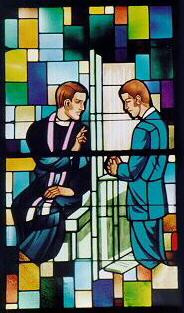Reconciliation
Jesus]...breathed on them and said: 'Receive the Holy Spirit. For those whose sins you forgive, they are forgiven; for those whose sins you retain, they are retained.'
-John 20:22-23

Through Reconciliation, Christians are freed from sins committed after Baptism. The Sacrament of Reconciliation is considered the normal way to be absolved from mortal sins which, it is believed, would otherwise condemn a person to Hell.
The Sacrament has four elements, three on the part of the penitent (contrition, confession and satisfaction) and one on the part of the minister of the Sacrament (absolution).
Catholics distinguish between two types of sin: Mortal sins are a grave violation of God's law that turns man away from God. Someone who is aware of having committed mortal sins must repent of having done so, and must confess them in order to benefit from the Sacrament. Venial sins, the kind that "does not set us in direct opposition to the will and friendship of God", can be remitted by contrition and reception of other Sacraments, but they too are rightly and usefully declared in confession.
First Reconciliation Preparation
The preparation for First Reconciliation and its celebration, takes place prior to the preparation for Confirmation and First Eucharist. The preparation begins in September and the celebration of the sacrament takes place near/in Advent.
For more information about this sacramental preparation, contact the Parish Office.
Schedule for First Reconciliation 2020
Registration Form for First Reconciliation
Session Resources
- Growing Up Catholic Lesson 1 First Reconciliation
- Growing Up Catholic Lesson 2 First Reconciliation
- Growing Up Catholic Lesson 3 First Reconciliation
- Growing Up Catholic Lesson 4 First Reconciliation
- Growing Up Catholic Lesson 5 First Reconciliation
- Growing Up Catholic Lesson 6 First Reconciliation
The Sacrament of Reconciliation as described by Fr. Raphael Mary of the Catholic Newman Center at the University of Washington.
